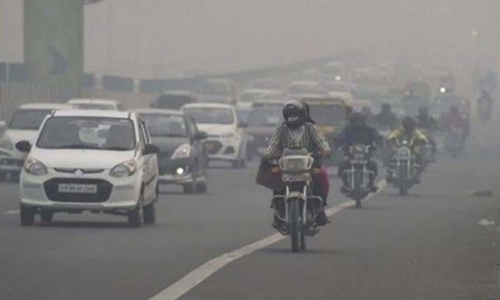WORLD / CENTRAL & SOUTH ASIA
Fighting a grim battle against pollutions

File Photo: Xinhua
The entire citizenship of the capital city of Dhaka is at health risk as the mega-city ranked top again among cities with the worst air quality early this week. It had an AQI score of 298 at 8am. The air was classified as 'very unhealthy' and in this state of air everyone may experience serious health hazards.
When the AQI value is between 201 and 300, the entire population is more vulnerable to be affected while children are advised to limit outdoor activities in this situation. India's Delhi and Mongolia's Ulaanbaatar occupied the second and third positions in the list of cities with the worst air quality with AQI scores of 219 and 215 respectively.
The AQI, an index for reporting daily air quality, informs people how clean or polluted the air of a certain city is, and what associated health effects might be a concern for them.
In Bangladesh, the AQI is based on five criteria of pollutants - Particulate Matter (PM10 and PM2.5), NO2, CO, SO2 and Ozone (O3). The Department of Environment has also set national ambient air quality standards for such pollutants. These standards aim to protect against adverse human health impacts.
Meantime, the High Court (HC) has asked the government to constitute a high-powered committee to formulate a guideline in order to reduce air pollution in and around Dhaka city. It passed the order recently following the capital's worsening air quality in recent times.
The committee, to be led by environment secretary, will comprise chief executive officers of Dhaka North City Corporation and Dhaka South City Corporation and managing director of Dhaka WASA.
The HC also ordered the authorities concerned to conduct mobile courts to shut down illegal brick fields in five districts, including Dhaka, within 15 days. The four other districts are Narayanganj, Munshiganj, Gazipur and Manikganj where brick kilns are largely contributing to polluting air.
There're many reasons for air pollution in Dhaka. There should be coordination in building public and private infrastructure, and among the agencies working with utility services. Proper management of various projects, including the elevated expressway, must be ensured.
The city's air pollution is deteriorating day by day. The responsibility lies with the Department of Environment to solve the problem. The department and the World Bank published a research report on the sources of air pollution in Bangladesh early 2019.
According to the research findings, the three main sources are brick kilns, fumes of vehicles and dust from construction sites. The dust particles are contributing to the city's worsening air pollution due to construction work without putting the site under cover.
Along with the air pollution, noise pollution, also known as sound pollution, has turned acute in the capital city as it always goes far beyond the permissible level, putting the public health at risk. The survey, conducted at 70 points of the city, reveals that sound pollution has reached the highest 120-130 decibels (dB) at many points -- almost double the permissible level.
According to a survey, about 10 per cent of city dwellers are now hearing impaired and 35 per cent are suffering from low-hearing problem due to high noise pollution. Although the government announced the Noise Pollution (Control) Rules 2006 to protect public health from sound pollution, it totally fails to enforce the rule putting the health of people at risk.
Reports say air pollution is a major issue around the world and kills seven million people annually -- one in every eight people around the world. And, of course, air pollution is a well-known and much-complained-about fact in Bangladesh. Few major global cities suffer from air pollution worse than Dhaka.
On its part, the government needs to conduct serious awareness campaign on the rules and health related issues on account of the air and noise pollutions. Such campaigns should be intensified in order to enforce the laws rigidly.

